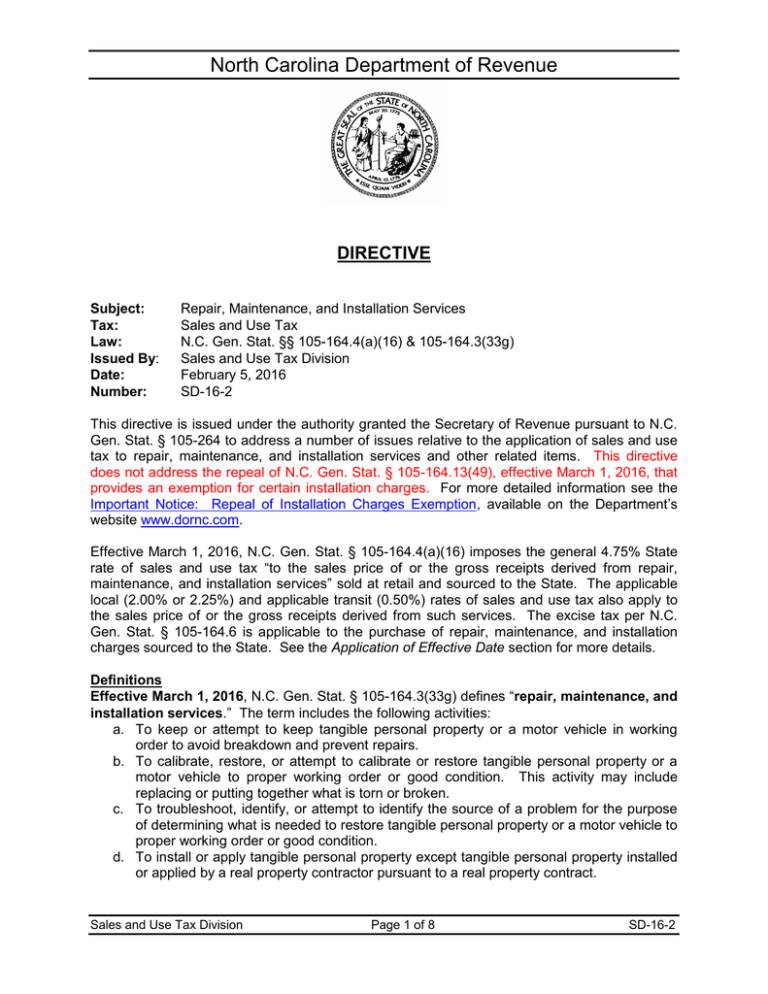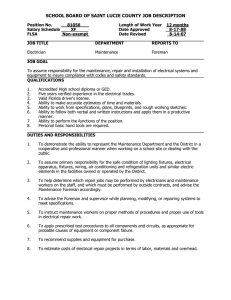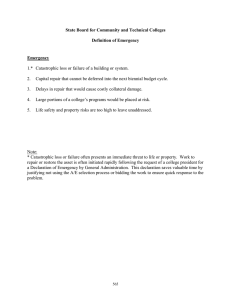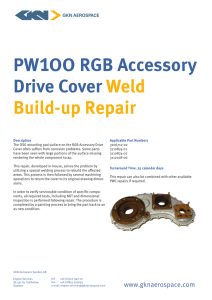North Carolina Department of Revenue DIRECTIVE
advertisement

North Carolina Department of Revenue DIRECTIVE Subject: Tax: Law: Issued By: Date: Number: Repair, Maintenance, and Installation Services Sales and Use Tax N.C. Gen. Stat. §§ 105-164.4(a)(16) & 105-164.3(33g) Sales and Use Tax Division February 5, 2016 SD-16-2 This directive is issued under the authority granted the Secretary of Revenue pursuant to N.C. Gen. Stat. § 105-264 to address a number of issues relative to the application of sales and use tax to repair, maintenance, and installation services and other related items. This directive does not address the repeal of N.C. Gen. Stat. § 105-164.13(49), effective March 1, 2016, that provides an exemption for certain installation charges. For more detailed information see the Important Notice: Repeal of Installation Charges Exemption, available on the Department’s website www.dornc.com. Effective March 1, 2016, N.C. Gen. Stat. § 105-164.4(a)(16) imposes the general 4.75% State rate of sales and use tax “to the sales price of or the gross receipts derived from repair, maintenance, and installation services” sold at retail and sourced to the State. The applicable local (2.00% or 2.25%) and applicable transit (0.50%) rates of sales and use tax also apply to the sales price of or the gross receipts derived from such services. The excise tax per N.C. Gen. Stat. § 105-164.6 is applicable to the purchase of repair, maintenance, and installation charges sourced to the State. See the Application of Effective Date section for more details. Definitions Effective March 1, 2016, N.C. Gen. Stat. § 105-164.3(33g) defines “repair, maintenance, and installation services.” The term includes the following activities: a. To keep or attempt to keep tangible personal property or a motor vehicle in working order to avoid breakdown and prevent repairs. b. To calibrate, restore, or attempt to calibrate or restore tangible personal property or a motor vehicle to proper working order or good condition. This activity may include replacing or putting together what is torn or broken. c. To troubleshoot, identify, or attempt to identify the source of a problem for the purpose of determining what is needed to restore tangible personal property or a motor vehicle to proper working order or good condition. d. To install or apply tangible personal property except tangible personal property installed or applied by a real property contractor pursuant to a real property contract. Sales and Use Tax Division Page 1 of 8 SD-16-2 North Carolina Department of Revenue Effective March 1, 2016, N.C. Gen. Stat. § 105-164.3(35) is amended and defines “retailer,” in part, as “[a] person engaged in business of delivering, erecting, installing, or applying tangible personal property for use in this State . . . unless the person is one or more of the following: 1. A person that solely [emphasis added] operates as a real property contractor. 2. A person whose only [emphasis added] business activity is providing repair, maintenance, and installation services where the person's activities do not otherwise meet the definition of a retail trade.” N.C. Gen. Stat. § 105-164.3(37) defines the term “sales price,” in part, as “[t]he total amount or consideration for which tangible personal property, digital property, or services are sold, leased, or rented. The consideration may be in the form of cash, credit, property, or services. The sales price must be valued in money, regardless of whether it is received in money.” The term includes the retailer's cost of the property sold; the cost of materials used, labor or service costs, interest, losses, all costs of transportation to the retailer, all taxes imposed on the retailer, and any other expense of the retailer; charges by the retailer for any services necessary to complete the sale; delivery charges; installation charges; credit for trade-in; and certain discounts that are reimbursable by a third party and can be determined at the time of sale in the manner required by the statute. N.C. Gen. Stat. § 105-164.3(46) defines “tangible personal property” as “[p]ersonal property that may be seen, weighed, measured, felt, or touched or is in any other manner perceptible to the senses. The term includes electricity, water, gas, steam, and prewritten computer software.” The term “calibrate” is defined in the Merriam-Webster Dictionary, in part, as “to ascertain the caliber of (as a thermometer tube); to determine, rectify, or mark the graduations of (as a thermometer tube); to adjust precisely for a particular function; to measure precisely.” The term “restore” is defined in the Merriam-Webster Dictionary as “to give back (someone or something that was lost or taken); to return (someone or something); to put or bring (something) back into existence or use; to return (something) to an earlier or original condition by repairing it, cleaning it, etc.” The term “condition” is defined, in part, in the Merriam-Webster Dictionary as “the state in which something exists: the physical state of something.” In Sales and Use Tax Directive, SD-15-1, the Department advised for sales and use tax purposes, the term “install” is “to fix in position for use” and “apply” is “to put or spread onto a surface.” Applicability A retailer engaged in business in the State is liable for the sales or use tax on the sales price of or the gross receipts derived from repair, maintenance, and installation services sold at retail and sourced to the State. Example: A person engaged in business in the State of selling appliances at retail is a retailer. Any charges by such person on or after March 1, 2016 for a service call for troubleshooting only is a charge for repair, maintenance, and installation services and is subject to tax. Sales and Use Tax Division Page 2 of 8 SD-16-2 North Carolina Department of Revenue A person whose only business activity is providing repair, maintenance, and installation services, where the person’s activities do not otherwise meet the definition of “retail trade,” is not a retailer and is not liable for sales or use tax on the sales price of or gross receipts derived from repair, maintenance, and installations services on or after March 1, 2016. Example: A person who only receives gross receipts from sharpening knives owned by customers and does not make other retail sales is not a retailer for sales and use tax purposes and is not liable for tax on receipts from sharpening knives on or after March 1, 2016, no matter that such charge meets the definition of “repair, maintenance, and installation services.” A person that solely operates as a real property contractor is not a retailer of repair, maintenance, and installation services and is not liable for sales or use tax on the sales price of or gross receipts derived from repair, maintenance, and installation services. Example: A person engaged solely in the business of installing and repairing in-ground septic tank systems is a real property contractor. The person is not a retailer of repair, maintenance, and installation services, no matter that the person may charge a fee for troubleshooting a problem with the septic tank system. A person engaged in “retail trade” on or after March 1, 2016 is a retailer and must treat all sales transactions as retail sales and is liable for sales or use tax on the sales price of the items or services sold at retail, unless the retailer maintains proper records to establish a sale is exempt from sales and use tax. This applies even though a person may install or apply tangible personal property that becomes part of or affixed to real property. A person who meets the definition of “retail trade” cannot operate as a retailer-contractor. For more information on retail trade, refer to the Directive on Retail Trade, SD-16-1, available on the Department’s website, www.dornc.com. A person who is a retailer-contractor prior to March 1, 2016 may be liable for sales or use tax on the sales price of or gross receipts derived from repair, maintenance, and installation services on or after March 1, 2016 if the revenue from retail sales is the majority of the person’s revenue. See the Directive on Retail Trade referenced above for more information. Application of Effective Date The tax on repair, maintenance, and installation services is effective for sales occurring on or after March 1, 2016 and to gross receipts derived from repair, maintenance, and installation services on or after that date. Pursuant to N.C. Gen. Stat. § 105-164.15A(a), the effective date of the new tax on repair, maintenance, and installation services is administered as follows: For repair, maintenance, and installation services provided and billed on a monthly or other periodic basis, the new tax applies to the first billing period that starts on or after March 1, 2016. For repair, maintenance, and installation services that are not billed on a monthly or other periodic basis, the new tax applies to amounts received for repair, maintenance, and installation services provided on or after March 1, 2016, except amounts received for repair, maintenance, and installation services provided under a lump-sum or unit-price contract entered into or awarded before March 1, 2016 or entered into or awarded pursuant to a bid made before March 1, 2016. Sales and Use Tax Division Page 3 of 8 SD-16-2 North Carolina Department of Revenue Repair, Maintenance, and Installation Services Below are examples of services generally considered repair, maintenance, and installation services. This list is not all-inclusive. Perform a service or tune-up on the following: motor vehicle; lawnmower, trimmer, edger, leaf blower, pressure washer, generator, chainsaw, tiller, auger, or other similar small engine; boat; aircraft; ATV or dirt bike; moped; golf cart; or bicycle. Calibrate any of the following: watch; scale; gun or scope; medical equipment; Lasik surgery equipment; thermometer; instruments (musical or otherwise); battery; meter; or camera. Clean jewelry, copy machine, printer, or other tangible personal property or a motor vehicle. Remove dents, dings, and scratches from tangible personal property or a motor vehicle. Restore or reupholster furniture. Patch or mend clothing, tires, or any type of inflatable. Sharpen blades. Polish shoes, jewelry, or silver. Troubleshoot a fluid leak or attempt to identify an unusual noise coming from a motor vehicle or other tangible personal property, whether or not the source of the leak or noise is located, determined, or resolved. Troubleshoot prewritten computer software to determine how to restore to proper working order. Reupholster boats. Re-string or re-grip tennis rackets, golf clubs, or musical instruments. Tune pianos or other musical instruments. Repair laptops, cell phones, remove viruses/malware, conduct diagnostic tests, or adjust computer settings. Install or apply tangible personal property may include: clothing alterations; painting tangible personal property; embroidery; screen-printing; window tinting for motor vehicles. Specific Exemptions Related to Repair, Maintenance, and Installation Services Effective March 1, 2016, N.C. Gen. Stat. § 105-164.13(61a) is amended and provides an exemption for “[r]epair, maintenance, and installation services provided for an item, other than a motor vehicle, for which a service contract on the item is exempt from tax under G.S. 105164.4I. Repair, maintenance, and installation services provided for a motor vehicle are subject to tax, except as provided under [G.S. 105-164.13(62a)].” This exemption includes repair, maintenance, and installation services for any of the following: An item exempt from tax under Article 5 of Chapter 105 of the N.C. General Statutes, other than a motor vehicle. This includes items exempt from tax under N.C. Gen. Stat. § 105164.13 and items exempt from tax under N.C. Gen. Stat. § 105-164.13E for qualifying and conditional farmers. Example: A qualifying farmer having repair work completed on a tractor for use in farming operations should not be charged sales and use tax on charges for repair, maintenance, and installation services to complete the repair work. Example: Repair, maintenance, and installation services for custom computer software are exempt from sales and use tax. Sales and Use Tax Division Page 4 of 8 SD-16-2 North Carolina Department of Revenue Example: Repair, maintenance, and installation services to a telephone company regularly engaged in providing telecommunications service to subscribers on a commercial basis of central office equipment, switchboard equipment, private branch exchange equipment, terminal equipment other than public pay telephone terminal equipment, and parts and accessories attached to the equipment. Example: Repair, maintenance, and installation services for broadcasting equipment and parts and accessories attached to the equipment to a cable service provider. For the purposes of this exemption, “broadcasting equipment” does not include cable. A transmission, distribution, or other network asset contained on utility-owned land, right of way, or easement. A transmission, an engine, rear-end gears, and any other item purchased by a professional motorsports racing team or related member of a team for which the team may receive a sales tax refund under N.C. Gen. Stat. § 105-164.14A(a)(5). This exemption expires January 1, 2020. An item subject to tax under Article 5F of Chapter 105 of the N.C. General Statutes. This includes mill machinery, mill machinery parts or accessories, and all items subject to the 1% privilege tax for certain machinery and equipment. Example: A retailer engaged in business in the State visits a manufacturing facility in the State to determine the problem with print heads that smear the product serial numbers during the printing process. The retailer cleans and calibrates the print heads and resolves the problem and does not install or apply any tangible personal property during the service call. The charge by the retailer meets the definition of repair, maintenance, and installation charges; however, provided the retailer obtains proper exemption documentation from the manufacturing facility, the sales price of the repair, maintenance, and installation services for cleaning and calibrating the print heads are not subject to either sales or use tax or the certain machinery and equipment privilege tax. A qualified aircraft or a qualified jet engine as defined in N.C. Gen. Stat. § 105-164.3. Effective March 1, 2016, N.C. Gen. Stat. § 105-164.13(61b) provides an exemption for “[r]epair, maintenance, and installation services purchased for resale.” Example: A motor vehicle collision repair shop that purchases tire alignment and balancing services from a tire retailer for the repair of a customer’s wrecked vehicle is purchasing repair, maintenance, and installation services for resale. Effective March 1, 2016, N.C. Gen. Stat. § 105-164.13(62) is amended and provides an exemption for “[a]n item or repair, maintenance, and installation services used to maintain or repair tangible personal property pursuant to a service contract taxable under [Article 5 of Chapter 105 of the N.C. General Statutes] if the purchaser of the contract is not charged for the item or services. . . . For purposes of this exemption, the term ‘item’ does not include a tool, equipment, supply, or similar tangible personal property used to complete the maintenance or repair and that is not deemed to be a component or repair part of the tangible personal property for which a service contract is sold to a purchaser.” Sales and Use Tax Division Page 5 of 8 SD-16-2 North Carolina Department of Revenue Example: A copy machine retailer is contacted by an obligor of a service contract to handle the service for a copy machine covered under a service contract sold on behalf of the obligor by the retailer on which tax was charged at the time of the retail sale. The copy machine retailer does not employ repairmen but, rather, utilizes a third-party repair company. The sale of any item or repair, maintenance, and installation services to the copy machine retailer or to the obligor are not subject to sales or use tax provided proper exemption documentation is provided to the seller by the purchaser. Effective March 1, 2016, N.C. Gen. Stat. § 105-164.13(62a) codifies the Department’s historical treatment for an exemption on “[a] replacement item, a repair part, or repair, maintenance, and installation services to maintain or repair tangible personal property or a motor vehicle pursuant to a manufacturer's warranty or a dealer's warranty.” There are no changes in the application of sales and use taxes to a manufacturer’s warranty or a dealer’s warranty. Example: Repair, maintenance, and installation services purchased by a manufacturer for an industrial equipment dealer to troubleshoot or identify an oil leak for a piece of industrial equipment continues to qualify as an exempt sale or purchase provided the charge for such is covered under the manufacturer’s warranty. Example: Repair, maintenance, and installation services sold to restore a recently purchased refrigerator to proper working order where a dealer’s warranty is still in effect continues to qualify as an exempt sale or purchase provided the charge is covered under the dealer’s warranty. To purchase qualifying repair, maintenance, and installation services exempt from sales and use tax, a person should issue to a seller Form E-595E, Streamlined Sales and Use Tax Agreement Certificate of Exemption, in connection with a qualifying purchase as the seller’s authority to exempt the sale of repair, maintenance, and installation services from sales and use tax. Alternatively, the data elements, as required by N.C. Gen. Stat. § 105-164.28(a) to substantiate an exemption, may be provided to a seller. A person who does not collect the applicable sales or use tax on the sales price of or gross receipts derived from repair, maintenance, and installation services remains liable for the tax due unless the person maintains proper records to establish a sale is exempt from sales or use tax. Exceptions The tax imposed per N.C. Gen. Stat. § 105-164.4(a)(16) does not apply to the sales price of or the gross receipts derived from the transactions below. Such are not considered repair, maintenance, and installation services. This list is not all-inclusive. State safety or emission inspections for motor vehicles. Safety or compliance inspections for tangible personal property required by a governmental entity. Examples may include safety or compliance inspections for the following: fire extinguishers, alarm/sprinkler systems, certain slicers, grinders, and balers. Septic tank pumping services. Self-service cleaning of tangible personal property or motor vehicles. Cleaning of real property that may include: housekeeping/cleaning/janitorial services, power washing, and removing debris from gutters. Lawn maintenance services that may include: lawn mowing, trimming/edging, leaf blowing. Sales and Use Tax Division Page 6 of 8 SD-16-2 North Carolina Department of Revenue The following provides examples of activities that are generally not considered repair, maintenance, and installation services, provided the person does not meet the definition of “retail trade.” This list is not all-inclusive. Pest control. Parking lot striping or sealing. HVAC repair. Garage door repair. Certain Purchases to Fulfill Certain Lump-Sum or Unit-Price Contracts A contractor (subcontractor, if applicable) that purchases repair, maintenance, and installation services to fulfill a lump-sum or unit-price contract where such contract was entered into, awarded, or entered into or awarded pursuant to a bid made prior to March 1, 2016, may purchase such services without payment of sales or use tax on the charges. To purchase such qualifying services without payment of sales or use tax, Form E-589J Affidavit must be fully completed by a contractor (subcontractor, if applicable) and submitted to a retailer. Form E589J will be amended in the very near future to provide direction regarding the use discussed herein and will be available on the Department’s website, www.dornc.com. Sourcing Repair, maintenance, and installation services are sourced in accordance with the sourcing principles set forth in N.C. Gen. Stat. § 105-164.4B. Repair, maintenance, and installation services performed on tangible personal property are generally sourced or received at the location where the customer can potentially make first use of the tangible personal property on which the seller performed the repair, maintenance, and installation services. In general, this is the location where the tangible personal property is returned to the purchaser. Example: A business located in the State services lawnmowers at the business’s location where the customer drops off and then picks up the serviced lawnmower. The business must charge the general 4.75% State, applicable local, and applicable transit rates of sales and use tax for the county where the business is located and where the repaired lawnmower is returned to the customer. Example: A business located in the State services lawnmowers at the business’s location, but the business picks up and delivers the serviced lawnmower to the customer’s residence. The repair, maintenance, and installation services are sourced to the owner’s residence since that is the location where the lawnmower is returned to the owner. The business is liable for the general 4.75% State, applicable local, and applicable transit rates of sales and use tax for the county where the owner’s residence is located and the location and where the lawnmower was returned to the customer. Example: A North Carolina resident ships a lawnmower out-of-state to have repair, maintenance, and installation services performed on the lawnmower. The out-of-state business is not engaged in business in North Carolina for sales and use tax purposes. The out-of-state business ships the repaired lawnmower back to the North Carolina resident via common carrier. The North Carolina resident is liable for the general 4.75% State, applicable local, and applicable transit rates of sales and use tax for the county where the North Carolina resident lives. Example: A business engaged in business in the State provides onsite calibration of customers’ equipment in the State and charges a trip fee. The business is liable for the Sales and Use Tax Division Page 7 of 8 SD-16-2 North Carolina Department of Revenue general 4.75% State, applicable local, and applicable transit rates of sales and use tax on the charges for onsite calibration, including the trip fee, for each county where onsite calibration takes place. Registration & Reporting Any person who is not registered with the Department and is required to collect and/or remit the general 4.75% State, applicable local, and applicable transit rates of sales and use tax on the gross receipts derived from repair, maintenance, and installation services must complete Form NC-BR, Business Registration Application for Income Tax Withholding, Sales and Use Tax, and Machinery and Equipment Tax. Both an online business registration portal and a web-fill version of Form NC-BR are available on the Department’s website, www.dornc.com. There is no fee required to register and obtain a certificate of registration. Gross receipts derived from repair, maintenance, and installation services and the 4.75% general State, applicable local, and applicable transit rates of sales and use tax must be reported on Form E-500, Sales and Use Tax Return, or through the Department’s online filing and payment system. Gross receipts for resale and exempt gross receipts derived from sales of repair, maintenance, and installation services must be reported on lines 2 and 3, respectively, when filing Form E-500. In addition, if local and/or transit tax is due for a county other than the county in which your business is located or for more than one county, Form E536, Schedule of County Sales and Use Taxes, must be completed in conjunction with Form E500. Rate of Tax The Department maintains the current and historical general State, local, and transit rates of sales and use tax on its website, http://www.dornc.com/taxes/sales/taxrates.html. Additional Information and Assistance Additional information regarding the application of the sales and use tax statutes to repair, maintenance, and installation services will be issued by the Department. General questions regarding this directive should be directed to the Taxpayer Assistance and Collection Center at telephone number 1-877-252-3052 (toll-free). To the extent that there is any change in statute or regulation, or new case law subsequent to this directive, the provisions in this directive may be superseded or voided. To the extent that any provisions in any other notice, directive, technical bulletin, or published guidance regarding sales and use tax issued prior to the date of this directive conflicts with this directive, the provisions contained in this directive supersede. Sales and Use Tax Division Page 8 of 8 SD-16-2


